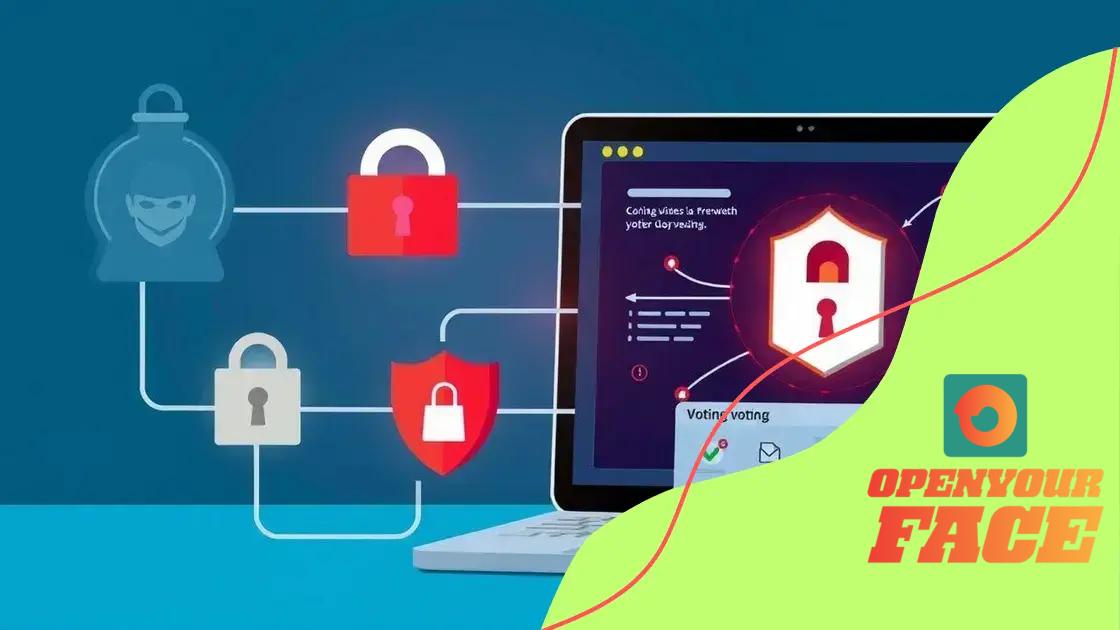The role of blockchain in the future of online voting

The role of blockchain in the future of online voting is to enhance security, transparency, and accessibility, ensuring that elections are trustworthy and efficient through its decentralized technology.
The role of blockchain in the future of online voting is a topic gaining attention as we seek more secure and transparent election processes. Have you ever wondered how technology can enhance democracy? Let’s dive into this innovative solution.
Understanding blockchain technology
Understanding blockchain technology is crucial for grasping how it can impact various sectors, especially online voting. At its core, blockchain is a decentralized digital ledger that records transactions across many computers. This makes it secure and difficult to alter, ensuring transparency and trust.
One significant feature of blockchain is its ability to create a permanent, unchangeable record. This feature is vital for elections, as it can ensure that every vote is accurately counted and that the results are trustworthy.
Key Features of Blockchain
There are several key features that make blockchain a powerful technology:
- Decentralization: Unlike traditional systems, blockchain does not rely on a central authority, which reduces the risk of fraud.
- Transparency: All participants can view the transactions, making the system more open and accountable.
- Security: Information is encrypted, ensuring that it is safe from unauthorized access.
- Immutability: Once a transaction is recorded, it cannot be altered or deleted, providing a permanent record.
Furthermore, blockchain technology utilizes nodes, which are individual computers on the network that verify and record transactions. This network of nodes works together to maintain the integrity of the system, thus preventing tampering and enhancing security.
As we delve deeper into online voting, it’s important to understand how this technology can address common issues such as vote tampering and fraudulent activities. The decentralized nature of blockchain ensures that no single entity can manipulate the voting process. This gives voters confidence that their voices are heard and counted accurately.
In summary, blockchain technology offers a robust solution for online voting systems. By understanding its core principles and features, we can better appreciate its potential to reshape the electoral landscape.
Benefits of blockchain for online voting
Benefits of blockchain for online voting are becoming increasingly clear as technology evolves. By harnessing the unique features of blockchain, elections can become more secure, transparent, and efficient.
One major benefit is the enhanced security that blockchain offers. With traditional voting systems, there are risks of tampering and fraud. However, by using blockchain, each vote is encrypted and linked to the previous vote, making it nearly impossible to alter the data once it has been recorded. Voters can have peace of mind knowing their choices are safe.
Key Advantages
Consider the following advantages of using blockchain in online voting:
- Transparency: Every transaction on a blockchain is visible to all participants, making the voting process open and accountable.
- Accessibility: Online voting can increase participation, allowing people to vote from anywhere in the world, which is especially useful for those living abroad.
- Cost-effectiveness: Implementing blockchain can reduce the costs associated with physical polling places and paper ballots.
- Efficiency: Votes can be counted almost instantly, leading to quicker results and enhancing voter trust in the process.
In addition, blockchain can enhance auditability. Every vote recorded is traceable, allowing for independent verification if any disputes arise. This is a critical factor for maintaining public confidence in election integrity.
The adaptability of blockchain technology also opens doors for innovations in voting methods. As systems evolve, there is potential for integrating other technologies like smart contracts, which could automate processes such as voter registration and ballot verification.
Exploring these benefits helps to highlight why blockchain is gaining traction as a solution for modernizing and securing electoral processes. It provides the tools necessary to make elections more reliable and reduces the potential for errors and manipulation.
Security concerns with online voting systems

Security concerns with online voting systems are critical as we look to implement blockchain solutions. While the technology offers many benefits, it is essential to address potential risks to ensure voter confidence.
One primary concern is the risk of cyberattacks. Online voting systems can be susceptible to hacking attempts, which could compromise the integrity of the election. Ensuring robust cybersecurity measures is vital to protecting voter information and the voting process.
Common Security Vulnerabilities
Several vulnerabilities exist within online voting systems:
- Unauthorized access: If hackers gain access to the system, they can alter or manipulate votes.
- Phishing attacks: Voters could be targeted with fake emails or messages that attempt to steal their credentials.
- Malware: Malicious software could be used to disrupt the voting process or steal sensitive data.
- System outages: Technical failures could prevent voters from casting their votes or result in lost data.
Additionally, there is a challenge regarding voter anonymity. It is crucial to ensure that while votes are counted accurately, voters’ identities remain confidential. Failure to protect voter anonymity can lead to a lack of trust in the system.
Testing and verification are also essential parts of deploying any online voting system. Continuous monitoring for vulnerabilities can help detect issues before they become significant threats. Regular audits of the voting system can further enhance security and maintain public trust.
By addressing these security concerns head-on, we can unlock the full potential of online voting while maintaining the integrity of the electoral process.
Real-world applications of blockchain in voting
Real-world applications of blockchain in voting are emerging as more governments and organizations explore innovative ways to secure elections. By applying blockchain technology, these entities can enhance the integrity and transparency of their voting processes.
One notable example is the use of blockchain in various pilot projects around the world. For instance, in 2020, the state of Utah allowed overseas voters to cast ballots using a blockchain-based mobile app. This initiative aimed to improve accessibility for military personnel stationed abroad, ensuring that their votes were counted accurately.
Examples of Blockchain Voting Initiatives
Several countries have started implementing blockchain for voting:
- Estonia: Estonia has been a pioneer in digital governance and allows citizens to vote online securely using blockchain technology. This system has gained significant trust among the voters.
- Georgia: In Georgia, a blockchain platform was used during the 2019 elections. The aim was to enhance transparency for local elections, allowing voters and observers to track ballots.
- United States: Various states in the U.S. are exploring blockchain solutions, with some small-scale tests conducted to assess feasibility for future elections.
These examples show a growing trend in leveraging blockchain for electoral processes. The decentralized nature of blockchain ensures that once votes are cast, they cannot be altered or tampered with. This builds confidence among voters and protects against fraud.
Moreover, blockchain can facilitate secure and efficient recounts; the recorded votes are immutable, allowing for swift verification if needed. As technology continues to advance, these real-world applications demonstrate the potential to positively impact democratic processes.
Future trends in blockchain and voting
Future trends in blockchain and voting indicate a significant shift towards more secure and efficient electoral processes. As technology advances, we can expect to see various innovations that enhance the voting experience.
One trend is the increasing use of smart contracts in elections. These self-executing contracts can automate various processes, such as verifying voter identities and ensuring that ballots are counted accurately. By streamlining these tasks, smart contracts can significantly reduce the time and resources needed for election administration.
Emerging Technologies
In addition to smart contracts, other technologies are set to impact online voting:
- Artificial Intelligence: AI can analyze voting patterns and ensure that all security measures are in place. It can also help detect fraud.
- Biometric authentication: This technology ensures that only eligible voters can participate, using fingerprints or facial recognition.
- Interoperability: Future systems are expected to integrate seamlessly with existing infrastructures, allowing various voting methods to coexist and function effectively.
- Enhanced privacy measures: With ongoing concerns about voter data security, future voting systems will likely prioritize stronger encryption methods to protect personal information.
As blockchain technology matures, we may also see an expansion of its applications beyond elections. For instance, it could be utilized for verifying voter registration or tracking election funding, further enhancing transparency.
Collaboration between governments, technology companies, and electoral commissions will be essential in shaping the future of voting. By working together, they can create robust systems that are both secure and user-friendly.
FAQ – Frequently Asked Questions About Blockchain in Voting
How does blockchain enhance security in voting systems?
Blockchain enhances security by creating an immutable record of votes, making it nearly impossible to alter or tamper with the results.
Can blockchain voting be used in all elections?
While blockchain voting shows promise, it may not be suitable for all elections due to varying legal and logistical challenges that need to be addressed.
What are the main benefits of using blockchain for elections?
The main benefits include increased security, transparency, accessibility for voters, and faster counting of votes.
How can voters ensure their privacy while voting online?
Voters can ensure their privacy through robust encryption methods and by using secure voting platforms that protect their identities.






